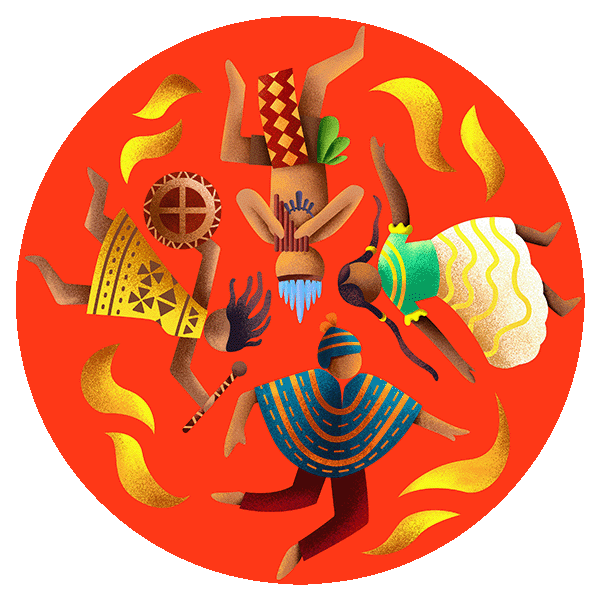
Indigenous Peoples And HIV&AIDS
On the 1st of December, every year, the international community observes a day that is dedicated to raising awareness of the AIDS pandemic.
As of November 2017, an estimated 36.7 million people worldwide are living with HIV, making it one of the most important global health issues.
This program looks at how HIV AIDS affects the International Indigenous community.
MUSIC
Sami Drum by Tyler. Used with permission.
Introduction: "Burn Your Village to the Ground" by A Tribe Called Red. Used with permission.
Interviewees:
Maasai Indigenous People Of Kenya and Their Food Systems
Maasai are semi-nomadic pastoralists who migrate within semi-arid lowlands and more humid uplands to obtain water and pasture. The large majority of them obtain their livelihood through husbandry of cattle, goat and sheep. Their food culture is very unique as they rely on meat, milk and blood from cattle for protein and energy needs. But lately with the gradual loss of elder members of the Maasai community who carry most of this people’s indigenous knowledge, Maasai indigenous communities are losing their customary practices.
Producer : Dev Kumar Sunuwar
Indigenous Communities and Food Security
Dev Kumar Sunuwar interviews Dr. Phrang Roy, Khasi indigenous and biodiversity activist, from Shillong, North-East India, on food security among Indigenous Peoples.
Indigenous People Affected By Human Trafficking
Indigenous communities are particularly vulnerable to the crime of human trafficking due to the systematic denial of health and wellness resources to which they are subjected. In this program, we focus on the Navajo Nation's response to increased rates of trafficking linked to mining/oil development, and the legal response the Navajo government has implemented to alleviate the harm caused by trafficking, which disproportionately affects Indigenous women and girls.
More than 100 Years Without Reparations to Victims of Genocide in Namibia
Between 1904 and 2004, the German state officially denied that genocide against the Indigenous Herero and Nama people in land that is now known as Namibia had ever occurred under German colonial rule, despite conclusive historical sources and internationally recognized investigations. Hear how communities are sorting through the painful legacy of this violence and indifference in the present in the following interview with Martinus Fredericks, Nama leader and activist.
We Are Still Here- A Message of Unity for Thanksgiving
It was the Wampanoag People, the people of the first light, that encountered the Pilgrims when they arrived to Turtle Island (North America) from Europe in 1620. Since 1863, Thanksgiving has been celebrated as a national holiday in the United States, mythologizing the violent events that followed European arrival into a story of friendship and mutual sharing. But the reality is that the Wampanoags’ generosity was met with genocide, and this truth has been systematically suppressed in the US education system, government, and popular culture.
Indigenous Kani Efforts To Promote Indigenous Medicinal Knowledge In India
Indigenous communities often hold invaluable knowledge about medicinal plants and healing practices rooted in the environment and resources of their traditional homelands. Anoop Pushkaran Krishnamma is working with the Kerala Kani Community Welfare Trust in partnership with Indigenous communities in India to record and preserve this knowledge, allowing for healing practices to be utilized by future generations.
MUSIC
"Remember Your Children," by Salidummay. Used with permission.
Introduction: "Burn Your Village to the Ground" by A Tribe Called Red. Used with permission.
Indigenous Community Initiatives In Liberia Model Improved Livelihoods
Ezekiel Tye Freeman is the executive director of Green-PRO, which helps Liberian communities develop sustainable livelihoods for self-reliance. Beekeeping training programs, for example, offer a lucrative and environmentally friendly economic alternative to mining or slash-and-burn farming for individuals. Freeman points to high levels of unemployment among Liberia's Indigenous population as a major problem that his organization wants to attempt to alleviate.
Indigenous Agroforestry Protects Water, Biodiversity, + Food Sovereignty
The Kalinga Mission for Indigenous Children and Youth, led by Donato Bumacas, promotes values of biodiversity conservation, with the goal of poverty reduction. These values are upheld using Indigenous traditional knowledge systems andd technologies to conserve and maintain the local forests. Sustainable Indigenous agricultural technology is implemented, with the goal of passing these systems down to future generations, as this knowledge was passed down to them.
Indigenize The Prevention Movement Against HIV And AIDS
HIV advocate Marama Mullen (Ngatiawa Māori), Executive Director of INA, the Maori, Indigenous, and South Pacific HIV/AIDS Foundation, discusses the HIV/AIDS prevention and awareness network that her organization has fostered among Indigenous communities in the South Pacific.
MUSIC
Song: "Atahualpa" by Yarina. Used with permission.
Introduction: "Burn Your Village to the Ground" by A Tribe Called Red. Used with permission.
